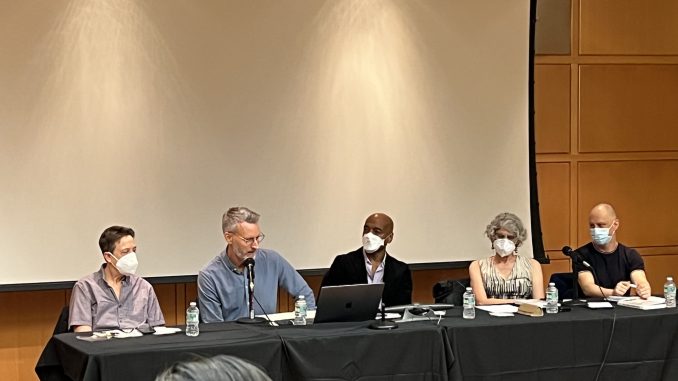
By Jason Lin
The Wolfe Institute for the Humanities at Brooklyn College hosted a conversation in the Woody Tanger Auditorium on Apr. 18 to help define and answer questions on AIDS-related cultural production and activism.
AIDS cultural production encompasses the wide range of creative expressions artists and cultural workers produce in response to the AIDS epidemic. This production includes the creation of literature, film, music, visual art, and other forms of artistic expression that address the social, political, and personal impact of AIDS. These works can raise awareness, challenge stigma, and honor those affected by the epidemic from different generations. Overall, it plays a crucial role in shaping public understanding of AIDS, providing a means for individuals and communities to cope with its emotional and psychological toll.
The event served to explore the newly published book “We Are Having This Conversation Now,” co-written by Theodore Kerr, a Brooklyn-based writer and organizer of the event, as well as one of the founding members of “What Would an HIV Doula Do?”
The works of Alexandra Juhasz, the author of “AIDS TV: Identity, Community and Alternative Video,” as well as AIDS educational videos, were also included in the conversation.
“I enjoyed hearing about the different ways people can get involved, whether it’s through reading or writing a book, watching or creating a film, joining an activist group, or simply having these important discussions,” said Sami Binder, a senior assistant to the director of BC’s LGBTQ Resource Center.
Other participants in the discussion included BC Sociology Professor Naomi Braine, who previously worked in the non-profit research sector on the issues of drug use and HIV. Matthew Burgess, an English professor at BC and an author of six children’s books, was also a panelist along with Mustapha Khan, an Emmy Award-winning film director, producer, and songwriter.
“It was a part that was very interesting where it talks about how COVID-19 affected towards everyone while HIV only affected certain people. I already have some knowledge, but this conversation was very interesting to me,” said Diana Bonilla, a junior at BC who attended the event.
The acknowledgment of how many people paid more attention to a new virus that spreads faster than a disease that leeches onto some people for years was something that was discussed at the event.
Panelists expressed desirable actions for BC to step up and share knowledge to those who are not completely aware of the danger of AIDS. In hopes that the references would be discovered by articles or news, “AIDS TV” was the invention of expansion to support the future generation’s knowledge of AIDS from decades ago.
“Hearing from the panelists inspired me to get more involved in AIDS-related activism. I plan to read more, especially Alex’s and Ted’s books! To learn more about both the history and where we are now in the movement,” added Binder.
At the end of the discussion, participants were hooked on one quote in particular from the book: “Silence is power, and silence wreaks havoc.”
The panelists defined this as to show how emphasizing silence can be a dangerous weapon. The book is meant to foster these conversations, so people can be braver in talking about their stories. Lessons echoed from this discussion are crucial to supporting survivors from the 1980s and 1990s, especially since they persevered to transform the negativity that comes with AIDS into a form of activism.
